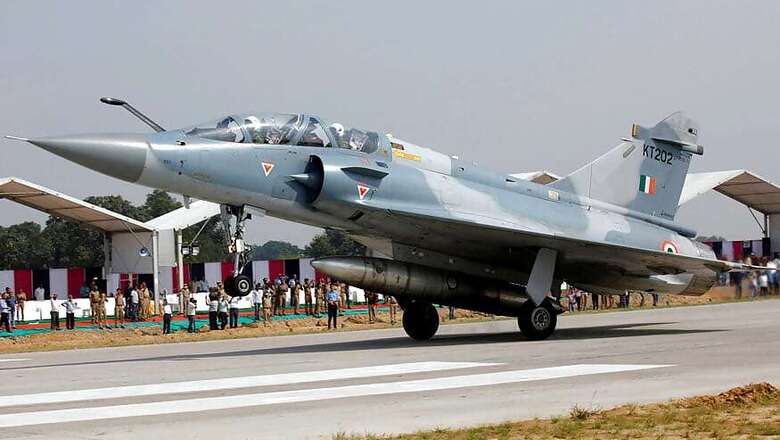
views
New Delhi: Twelve Indian Air Force (IAF) Mirage-2000 jets crossed the Line of Control (LoC) early on Tuesday morning and destroyed terror camps of Pakistan-based Jaish-e-Mohammed in Balakot. The air strike, which has been dubbed surgical strikes 2.0, comes two weeks after a terror attack on CRPF soldiers in Pulwama, Jammu and Kashmir.
Foreign secretary Vijay Gokhale on Tuesday confirmed the air strikes and said a large number of JeM terrorists, trainers and senior commanders were eliminated in largest JeM camp in Balakot. The camp was led by Maulana Yusuf Azhar alias Ustad Ghauri, brother-in-law of JeM Chief Masood Azhar, Gokhale said. According to the government, the camp was located on a hilltop, deep in a forest, and far away from any civilian presence.
On whether India is currently in a state of war, former IAF top guns said in unison that what India did was a necessary act to counter terrorism. However, if Pakistan retaliates, it would be an act of war, they said.
Vinod Patney, Former Air Marshal, Indian Air Force
Patney spoke to News18.com and said the IAF strike was a risky operation, but a necessary one as well. “We had crossed the PoK border in 1965, 1971 and every time there was a war, except during Kargil. However, this is for the first time that we have done so during peace time, to the best of my knowledge,” Patney said.
“The risks involved in an air strike are being shot down. You can be shot down in the air, you can be shot down from the ground. And for these aircraft, even a small shot can mean a lot of trouble for the pilots. If there is a strategic hit, it can be fatal as well,” the retired Air Marshal added.
However, Patney believes such risks are calculated ones that one must often take in order to deliver the mission. “Nothing is 100 percent fool-proof. You plan and choose the best way forward and then adopt it.”
Patney also questioned Pakistan’s statement over the air strikes. Major General Asif Ghafoor, Director General of Inter-Services Public Relations (ISPR), the media wing of the Pakistan army, acknowledged the air strikes in a tweet on Tuesday morning. "Indian aircraft intruded from Muzafarabad sector. Facing timely and effective response from Pakistan Air Force released payload in haste while escaping which fell near Balakot. No casualties or damage," he said.
According to Patney, the possibility of a Pakistani reaction is always possible. “It surprises me when I hear the Pakistan spokesman who says that all our bombs have missed their target. Therefore, if there was no damage, what will the retaliation be about? However, on the other hand, Pakistan also has to pander to the needs of its locals. If there were deaths, there will be local families involved as well,” Patney said.
Manmohan Bahadur, Former Vice Air Marshal, Indian Air Force
Bahadur, former Air Vice Marshal and Additional Director General, Centre for Air Power Studies, also said the air strikes represented a new dawn for Indian operations. “It is for the first time India crossed the PoK border. It was during the time of Kargil war that we had decided that PoK remains our self-set border beyond which we will not invade,” Bahadur said.
Bahadur called the air strike across the border a risky and deliberate measure and said India now faces risk of similar retaliation from Pakistan. “The biggest risk of an air strike is from the opposite country’s air defence. Also, if we have any loss in terms of airplane or a pilot, it makes for bad press, very bad publicity. But the good part is that everybody has come back,” Bahadur said, adding that an air strike is “hugely potent for disruptive perception”.
Bahadur told News18.com that the situation is now open as Pakistan has accepted that a strike happened. “They have tweeted out pictures and come out with statements on Twitter. They have said so officially that India has struck at so called Azaad Kashmir.”
According to Bahadur, Pakistan has lost face following Tuesday’s air strike. “Secondly, they have accepted that they did not shoot down any aircraft. So this has basically brought Pakistan’s defence forces to bad light,” he said.
This makes Pakistan, Bahadur said, likely to retaliate. “They will now be pondering on how to respond. This is because what will they respond against? Do they respond against our infields? Because we have stuck to our targets, we have not struck their military base camps.”
According to the former Air Vice Marshal, the ball is in Pakistan’s court now and escalation depends on them. “If they escalate, it will be war. We have not started war because we have only struck terror camps,” he said.




















Comments
0 comment